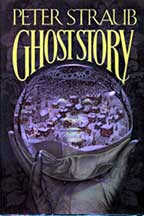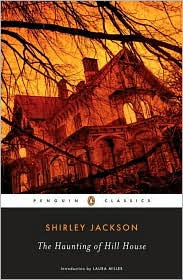
Because I am a little shit, and because I have a tendency to soak up and project hyperliberal dogmas of oppression and subjugation, my first thought after completing Peter Straub's seminal Ghost Story was "another goddamned horror novel about poor helpless men besieged by an eeeeevil woman."
On a very surface level, it's an accurate observation. The only two women to get any real screen time are the shapeshifter antagonist in her various guises and the wife of one of the protagonists, who is a cheatin' ice queen with a heart like shards of cold broken glass. The shapeshifter is a seductress kinda monster who uses her wiles to send men to their destruction. Her acolytes speak of her in reverent tones. She's eeeeevil because she makes men love her too much, but refuses to be subjugated by that love.
This is ultimately a boy's story about the one that got away, about impotent men cowering in the face of a female power. It's also pretty damned good.

I fully intend to be in the Chowder Society when I grow old.
One of the most popular tweets I ever...uh...tweeted (JoeAverageSF, if you're interested) was "I can't wait to be old. I want to be an old theatrically morbid man like Vincent Price." Well, I want to be like the Chowder Society, the four old men who get together and tell ghost stories, starting each one with the same eerie introduction, "What's the worst thing you've ever done?," followed by the response, "I won't tell you that, but I'll tell you the worst thing that ever happened to me...the most dreadful thing..."
Eeeeeee! Creepy!
The old men in the story are really likable and engaging, the setting is genteel, and the tales they tell are genuinely eerie. This book plays toward my taste in quiet, evocative horror and the evil that descends on the gentle old professionals is slow and spooky and delightful.

As much as I enjoyed the book, and I really did, there are a couple things that bug me. It has the feeling of being improvised as the author went along. Antagonists that start out as distant and ghostly suddenly become little chatterboxes as they're encountered later. Behavior, motivations, and patterns shift, and people get a case of the stupids later in the book. There's also a certain aimless passivity to the heroes. They spend most of the book waiting to get got, rather than being proactive in any meaningful sense. The most dynamic step they take is to bring in the nephew of one of their murdered contemporaries, who appears to be haunted by the same spirit.
Speaking of the spirit, one of the big questions that bugged me about the book is the antagonist's motivations. She's an immortal shapeshifter who is clearly contemptuous of humanity, yet she wastes decades of her existence hassling four random chumps in an isolated small town? Really? Is her evil that banal and unimaginative? The story would have made more sense if she were an actual ghost haunting them because ghosts tend to fixate on a subject. The creature at the center of Ghost Story ultimately came off as petty.

I do want to make mention of something that I found sort of appealing, which was the relationship between Stella and Ricky Hawthorne.
I think we're living in an age where people are becoming more skeptical about the idea of monogamy. Maybe it's the fact that I'm safely ensconced in a bubble of Brooklyn dating, where being "friends with benefits" is too much commitment, and I'm a Dan Savage devotee who read Sex at Dawn a couple times, but my view of human relationships tends to be a little more...progressive than the mainstream.
Horror, as I've often said, is a fundamentally conservative genre. It's all about the status quo and it's often written by people who hold fairly traditionalist views. That attitude is often an asset, as horror is usually about drawing firm black-and-white lines between good and evil, but it tends to falter around deviations in human behavior.
Somehow, Ricky and Stella work. She cheats, he knows about it, and all seems well. On paper, it appears that she can't help herself and he loves her enough to tolerate it. I suppose to some people that would appear to be a catastrophic state of being, but they seem happy. It works for them, and I liked their dynamic, even if I felt she was a throwaway character.

One of the weird things I took away from reading Ghost Story was the fact that it was less effective as it became a more traditional horror novel.
As a tale of four old men, haunted by a tragedy, who find cathartic release by telling ghost stories to one another, it was a great, evocative book. Once they're knife-fighting developmentally disabled werewolf boys in movie theaters, the book became garish and kinda goofy. Still, the book works. I like the characters, I like their world, I liked the pacing (which was eerie, but not foot-draggingly slow), and I liked the little moments of creepy terror. The dreams, the visits from dead friends, the moments of isolation and menace were all wonderfully done.
I have a litmus test when I read horror fiction. First I look at the non-horror elements. Do they hang together? Are the characters compelling? Do I give a shit about who they are and how they interact and collide against each other? Basically, could they hold up in a book without the horror elements? I absolutely felt that Ghost Story passed this test. There are a lot of challenging, engaging characters and they were all richly detailed and fascinating.
The second part of my litmus test is studying the horror elements. Are they original, or at least engaging? Do they improve the human drama or do they just get in the way? Do they make sense? Are they scary? For me Ghost Story mostly passed the test. When the threat was more ephemeral, when the demon facing the the Chowder Society was more vaguely defined, it was an effective horror story. Once we got to know Eva Galli, she became more of an annoyance than anything else.

I was actually a little bit spooked as I read the book because many of the elements of the novel are very similar, and probably better done, to elements of the novel I'm writing for my MFA.
Old friends tied by strange social rituals and a violent crime. An ethereal menace that lurks in the shadows and begins a campaign of psychological warfare before striking with sudden, decisive violence. A strongly defined setting that the characters play off of and experience in their own unique ways.
Screw it. Straub can call a good tune. I will dance to it.
Overall, I give this book my bump. I enjoyed reading it and I think it's a solid introduction to Straub's key work. It's recommended for fans of more subdued, quiet horror.
Also, the movie is pretty good, too.















